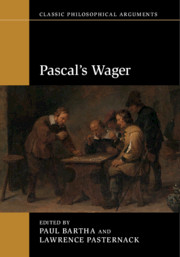Book contents
- Pascal’s Wager
- Classic Philosophical Arguments
- Pascal’s Wager
- Copyright page
- Contents
- Figures and Tables
- Contributors
- Acknowledgments
- Introduction
- Part I Historical Context and Influence
- 1 Pascal’s Wager and the Origins of Decision Theory: Decision-Making by Real Decision-Makers
- 2 The Wager and Pascal’s Theology
- 3 Pascal’s Wager and the Ethics for Inquiry about God
- 4 Pascal and His Wager in the Eighteenth and Nineteenth Centuries
- 5 The Wager and William James
- Part II Assessment
- Part III Extensions
- Bibliography
- Index
1 - Pascal’s Wager and the Origins of Decision Theory: Decision-Making by Real Decision-Makers
from Part I - Historical Context and Influence
Published online by Cambridge University Press: 28 September 2018
- Pascal’s Wager
- Classic Philosophical Arguments
- Pascal’s Wager
- Copyright page
- Contents
- Figures and Tables
- Contributors
- Acknowledgments
- Introduction
- Part I Historical Context and Influence
- 1 Pascal’s Wager and the Origins of Decision Theory: Decision-Making by Real Decision-Makers
- 2 The Wager and Pascal’s Theology
- 3 Pascal’s Wager and the Ethics for Inquiry about God
- 4 Pascal and His Wager in the Eighteenth and Nineteenth Centuries
- 5 The Wager and William James
- Part II Assessment
- Part III Extensions
- Bibliography
- Index
Summary
- Type
- Chapter
- Information
- Pascal's Wager , pp. 27 - 44Publisher: Cambridge University PressPrint publication year: 2018
- 2
- Cited by

